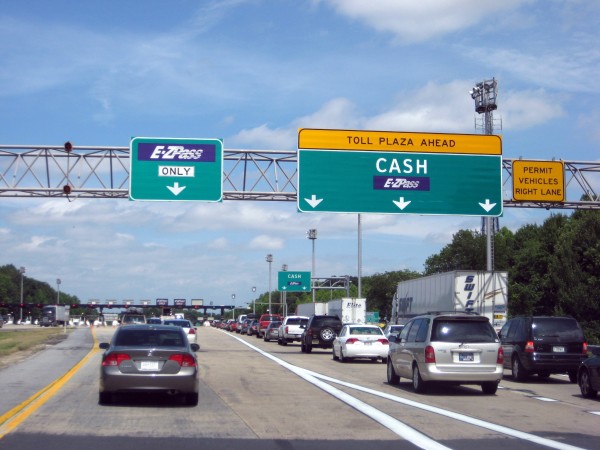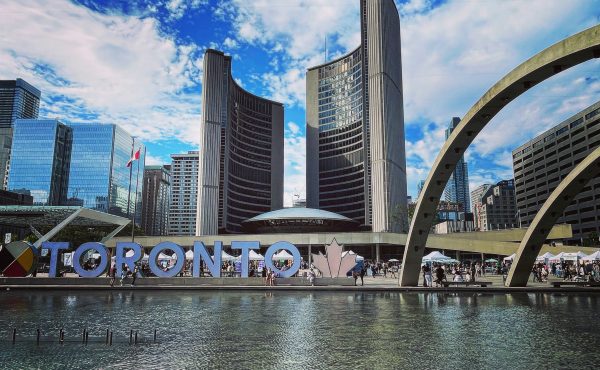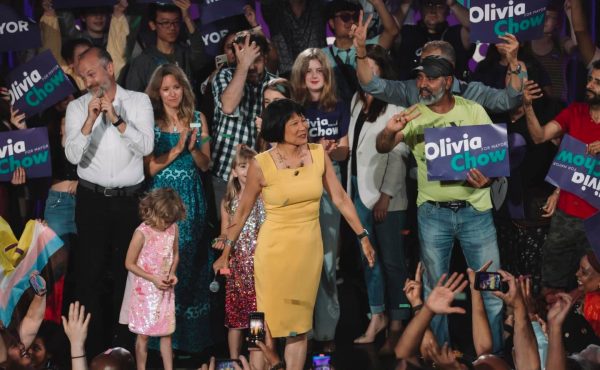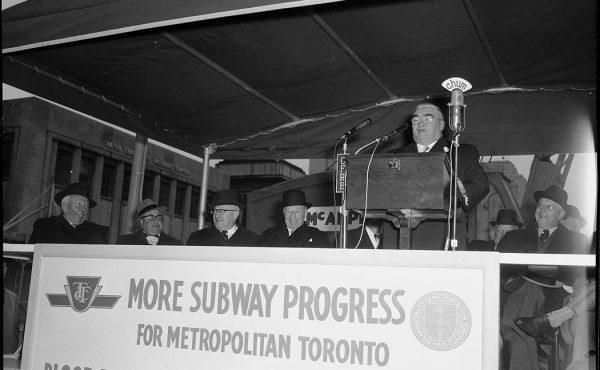Last week, I proposed in this space three key moves that Kathleen Wynne’s Liberals could make to signal their seriousness about funding GTA transit expansion. But if the re-elected premier wants to take things to the next level and make a bold and region-altering move, here’s a fourth: Implement the revenue tools recommended last year by Metrolinx (HST, gas tax, parking levy, development charges) as a means of making up the approximately $20 billion gap between what the government has pledged to invest in transit and the sum required to complete the Big Move over the next twenty years.
If there was ever a propitious moment to make, well, a big move, we’re absolutely in the middle of it. In almost 20 years of covering urban affairs in Toronto, I can’t remember another opportunity quite this ripe.
Consider the architecture: politically, Wynne not only finds herself at the helm of a solid, urban-based majority, while she also faces two opposition parties in shambles. The seat-reduced Tories will be leaderless — and toothless — as of July 2. The NDP’s Andrea Horwath hasn’t yet had her head handed to her, but the election results suggest that progressives abandoned her pocket-book electoral agenda in droves. It’s an alignment perfectly suited to pushing ahead with important but unpopular decisions.
Fiscally, Wynne is promising the sun, the moon and the stars. But her proposed spending levels, and the associated deficit projections, are unsustainable. Bay Street and the bond rating agencies have already started pressuring the Wynne government to dial back the borrowing required to implement her progressive agenda. And with the threat of higher debt servicing costs added to Ontario’s staggering $295 billion in outstanding debt (yes, you’re reading that number correctly), the government will yield – it’s not a matter of “if”, it’s a matter of “when.”
Wynne, in short, will face a fork in the road: either adopt a far more modest agenda than the one she ran on, or impose new taxes to make up the shortfall.
Economists and business groups [PDF] like the Toronto Region Board of Trade (TRBOT) have already signaled their support for revenue tools, including road-pricing measures, such as a gas tax. Indeed, I’d like to see TRBOT come out now with a reminder to Wynne’s Liberals that the region’s largest business lobby backs the type of policy fix adopted by other cities (e.g., Los Angeles and Vancouver) that had to make tough decisions about how to fund such long-term investments.
Yet if Wynne’s Liberals truly want proof of concept, they need only look back to 2003 and the aftermath of Dalton McGuinty’s first majority. During the campaign, Premier Dad solemnly pledged to the Canadian Taxpayers Federation that he wouldn’t raise taxes. After the election, however, the Liberals made an unpopular but necessary decision: to impose a health care levy to tackle runaway medical costs and re-build a system hobbled by Mike Harris’ common (non)sense agenda.
McGuinty, of course, was attacked as a promise-breaking hypocrite (to wit, here’s a press release from one John Tory, then the Progressive Conservative leader, waving an accusing finger). But as Tory well knows, we expect governments to make difficult choices and that responsibility often entails confronting the confusion in an electorate that invariably says it wants both more services and lower taxes.
Tory’s 2007 campaign to call out McGuinty on the health care levy failed. Since then, the levy has faded in our political consciousness, although certainly not to those who mind the provincial treasury. Even Tea Party Tim Hudak didn’t utter a peep about it in this past campaign. The price of McGuinty’s alleged duplicity is a stable health system. The economy didn’t collapse, and Ontario’s hospitals are far better equipped to deal with the needs of an aging population.
To my mind, Wynne now has a once-in-a-generation opportunity to tackle the congestion crisis in much the same way that McGuinty seized the opportunity to break the back of the health care cost spiral Harris created.
Yes, she’d be roundly accused of betraying the voters, blah, blah, blah. But Wynne is also the same politician who promised to lead us through an adult conversation about revenue tools, which was a polite way of saying that if we want less gridlock, better transit and a healthier region, it’s gonna cost something.
What’s equally clear is that this moment will pass quickly. The opening months of a majority term, as her strategists well know, represent the window when one spends one’s political capital. Leaders who preen or consult excessively squander that opportunity, and it doesn’t come back any time soon.
As World Pride Week opens, we’ll hear a lot about how Kathleen Wynne has made history by becoming Canada’s first out premier in an election in which her sexual orientation didn’t cause so much as a ripple. And that’s fantastic.
But if she really wants to leave her mark on the GTHA, she’ll firmly inform her cabinet, and the region’s 6 million residents, that her government has no choice but to impose new transit taxes as a means of delivering its progressive agenda.
Just do it, Kathleen. (P.S.: The sky won’t fall.)






19 comments
As you say Kathleen is the last one standing in the sandbox. Her opponents are discredited and the promise of an adult discussion has to be transformed into an adult solution. Except for the nudging of the Health Tax into the Income Tax back in 2003 there has not been an increase in the Provincial Income Tax since 1994. Who can sustain their household on a revenue source more than 20 years old? The 2 points of the GST that McGuinty squandered an opportunity in capturing for the future of this province needs to be accessed now. There will be now infrastructure in good repair when our children come to inherit the province…they will have to start from scratch and they will curse us.
It does my heart good to see the hopeful John Lorinc is back at the keyboard. Yes we need to fund transit. Yes, we need to be grown ups and admit that services cost money. But why, why, why does the conversation about funding progressive policy always seem to veer into regressive taxation? If we pay for progressive investments disproportionately on the back of lower income people can we truly be said to do progressive work?
I’ve asked in this space before and feel I must ask again: What is wrong with using the income tax to pay for transit infrastructure? My parents did it, I’d be happy to as well.
Gord
@GordPerks: Which level of government would this tax be levied from? Provincial income tax blows open the “Sudbury taxes for Toronto subways” issue which even the Ontario NDP aren’t holding the line on any more.
If a regional tax is imposed that raises other issues of borders between taxed and untaxed areas and about service quality within taxed but currently underserved areas. We saw what happened to the VRT which did not fall on 905er transit users and accounted for possession rather than use of vehicles.
Also, care should be taken to look at the work that has been done on realistic expectations for income tax recovery, since according to some, nobody has tax accountants or other means to shield their means and thus tax revenue increases on a linear basis. This was Prof Mike Moffatt (Western) on Wynne’s last budget:
“The budget raises the rate of Ontario income tax on those earning between $150,000 and $220,000 from 11.16 to 12.16%, and from 11.16 to 13.16% for those earning between $220,000 and $514,090. The government estimates that the measure will increase government revenues by $635 million in 2014-15, $685 million in 2015-16 and $745 million in 2016-17. There is no indication in the budget how these numbers are estimated, so I spoke to government officials, who indicated that these are ‘straight-line’ estimates and do not take into account possible behavioural responses by these high income earners. Given the many options that these persons have to restructure activities to reduce their tax burden, the actual amount of revenue raised will be significantly lower.”
(Source: http://www.canadianbusiness.com/blogs-and-comment/ontario-budget-four-unresolved-questions/)
Let’s think about 21st century solutions – ones actually in use, not pie in the sky – like road pricing/congestion charging/variable parking pricing where the public can see the connection between charge and cause, and ensure that this money is spent on visible transit improvements rather than frittered away. This can then be built on to create lasting mode shifts.
I would agree with Sal about raising the provincial portion of HST to 10pc but that should be a deficit reduction measure to avoid austerity measures. We have to have the money to walk and chew gum in this province, programmes like all day kindergarten need to be funded, substantial deficits like hydro transmission infrastructure need addressing and Glen Murray’s Shinkansen needs to be built (well, maybe we could manage with an Acela instead).
Even 15% HST is reasonable by European standards where VAT can be 20%+, we just have to figure out how to give border commercial areas a way to compete against US malls in NY and MI as well as creating a lower rate of HST for certain critical services and utilities.
I agree that taxes of broader application such as the HST are not as good as income taxes to pay for transit, but parking levy, gas tax, tolls and congestion charges are all useful. They are regressive, but we need taxes that affect demand or we are doomed to gridlock and pollution.
In some corners, especially in the Provincial NDP any fee that is regressive is rejected. I think this is a grave error. We should redistribute through income tax (and subsidizing things we want more of anyway like education and health programs) and tax things we want less of.
Until there is a higher price for pollution and gridlock, a price that can help pay for transit, we will be stuck with the status quo.
I think having less pollution, helping to address global warming, and funding transit is progressive work. Income tax can still be used to address inequality, but for other issues other tools are useful.
@gord I’m not averse to income tax being part of the mix. But I would point out that we shouldn’t romanticize what the income tax did in the post-war period. Remember that much of what was built in the 1950s/60s/70s was financed also by deficit spending — i.e. borrowing — at levels that ultimately exceeded governments’ ability to service all that accumulated debt. Which brings us to Paul Martin and 1995, and the downloading that followed.
Agree with Gord. We don’t have to do this based on regressive taxes. Income taxes, corporate taxes, estate taxes, financial transaction taxes, align capital gains to be simply ‘income’, tax intellectual property. I like the taxing intellectual property option the best. “Hey Disney, in exchange for enforcing your copyright, you will be paying a 1.25% property tax on your intellectual property.”
If we’re going to have an adult conversation about funding transit and transportation networks, can we also have an adult conversation on planning (and building) transit and transportation networks?
Perhaps then we could talk about why John Tory’s “SmartTrack” proposal isn’t very smart, or why politicians need to get serious about building a proper Downtown Relief Line instead of a cheap ineffective GO Transit “alternative” that won’t attract enough passengers to make a difference. We could also get the leaders in Hamilton to commit to LRT for their B-Line, and Brampton to accept the Hurontario-Main LRT while calling for more Züm bus service as well.
Then we could take a serious look at HOT Lanes (such as my GTA MOVE Network proposal) and building better local transit.
While a gasoline tax would not be palatable right now, parking levies should definitely be factored into the revenue tools mix.
Cheers, Moaz
The notion floated above about Disney sounds a bit Mickey Mouse to me. Banter aside, most discussions of intellectual property taxation I can find are about patent licencing, not media copyright. Is there some contention that copyright licencing fees are not taxed/insufficiently taxed in this jurisdiction, sufficient to put a dent in Ontario’s needs and within the scope of the Province’s taxation powers? Or is this more magic beans?
I agree with Mr. Lorinc: enough waffling, just show some leadership and and build. One thing that concerns me however is the capacity of the construction industry to build the sheer amount of new projects needed in the GTA . You can imagine the big construction firms with dollar signs in their eyes charging top dollar to implement these projects. If we know we have a 20 or 30 year pipeline of funded work the government should potentially create its own construction firm or a consortium that would agree to fixed prices over the construction timeframe. This could be an alternative to the P3 type of arrangement the locks government into long-term contracts with private interests. Well the same time providing long-term pricing stability and ensuring the taxpayers don’t get ripped off. Indeed there are precedents for this in Ontario and Canada going back to the 1950s which was the last period we built major infrastructure that went beyond the capacity of local construction firms to deliver.
Your proposal to implement the recommendations of Metrolinx is spot on. I would go one step further and add tolls to the DVP and Gardiner.
John,
Here I was all cheerful that you were back to being hopeful, and you instantly produce a black cloud. We agree that the 95 federal budget was a terrible moment in Canadian history. As to the rest I would challenge you two ways.
First, never conflate financing with funding. Whichever source of revenue we choose we can pay as we go or borrow and pay off during the lifetime of the asset. Income tax to pay of debt or income tax to pay from current revenue: it’s still income tax.
Second, all taxes and fees face the possibility of an irresponsible government coming along later and cutting the funding. The best path is to not vote for them. This really isn’t a point about income tax itself.
Cheer up and think progressive thoughts!
Gord
I think the simple reason no one is looking to income taxes is that the other people’s money has run out. The top marginal rates are at or near an inflection point where raising the rates doesn’t gather much revenue. To raise real money you’re going to have to raise rates on the middle class, otherwise known as “hard working Ontarians” or some such nonsense. No political party is willing to contemplate a broad based income tax increase.
Consumption taxes are also harder to dodge. Wealthy people can manipulate their incomes to manage their income taxes. Perfectly legal, and as you raise rates more and more people find it to be worthwhile to do. But the hst gets paid. Property taxes get paid. And road tolls, gas taxes, and use fees get paid.
If you want to give money to poor people (sorry, be progressive if you prefer) the tax system is very well set up to do just that. HST rebates, refundable tax credits, etc…
An adult conversation about transit would include why we have had decades of rampant development across the GTA without corresponding job growth. The fact that half the jobs in the GTA are now “precarious” positions means that we have a tremendous oversupply of labor in the GTA. And yet, federal immigration policy continues full tilt (whereas pre-Mulroney, we had a system that was tap-on or off depending on actual job growth). It is clear that this strategy benefits the corporate sector… but it is nonsense to suggest that it is benefitting most citizens, or even recent immigrants who are having a harder time establishing themselves compared to those in decades past.
An adult conversation about transit would look at why development fees (in Toronto and across the GTA) fall woefully short of what is required to finance the added infrastructure required by the additional units added each year. Horwath was right to protest that tolls place a disproportionate burden on average families, many of whom are in low paid, precarious employment.
An adult conversation about transit would also look at why there is no regional planning body in place across the GTA (something only the province can mandate). Regional transit planning is great… but regional transit planning independent of overall regional planning is a mug’s game. Why are we playing a mug’s game.
An adult conversation about transit would also look at first using EXISTING infrastructure to best meet emerging demands… something that of course has yet to be done.
Matt,
until such time that all forms of income are taxed equally, we will steer clear of any inflection point. As far as manipulating their income, yes wealthy people have tools that make this legally possible. That is a choice though, not some innate attribute. Policies can ( and should ) change.
Maybe these comments demonstrate what an adult conversation would look like. The problem with Gord Perks’ (& the NDP’s) position is that if you take most of the tools off the table nothing gets done. As some commenters have already pointed out, revenue tools that link directly with funding transit are easier to implement, more likely to be accepted by ‘most’ users and least likely to be messed with by future governments. By all means use some progressive tax measures as part of an overall funding plan and balance any new regressive taxes with other income tax measures to limit their effect, but it’s naive to think you’re going to get the funding needed to deal with Toronto’s transit mess without putting ALL the tools on the table.
Along with the “approved” revenue tools, we need the Vehicle Registration Tax back, as well as quickly doing the tolls on the Gardiner/DVP for basic equity, as nearby transit systems have user fees, so why not the vastly more inefficient/polluting roadway?
There’s also a LOT that could be done within existing parameters, without the concrete etc. This includes busways on the DVP/Gardiner, and yes, bike lanes on Bloor/Danforth parallel to the crowded subway to ease a bit of the pressure. A re-think of some projects might also be wise. Going beyond Scarborough, I don’t think the DRL stubway is good enough value – there could be some combination of surface routes and smarts to give us a better transit-first solution.
Gerry,
I can’t fathom how anyone could conclude that without the transit revenue ‘tools’ suggested there is no possible way to generate funding. Are you suggesting that people could only afford to pay x amount of additional taxes if they came from one source but not another? IMO, the appeal of the current ‘tools’ is that the incidence of these taxes are mainly falling on those whom do not use the current system much and will benefit little from the proposed additions. Why else to you think that the BoT has been so vocal in pushing this? Their members benefit the most and pay the least.
I agree, now is the time to do it.
If we are being adult, let’s call the tool a tax.
I would look for a ‘tool’ that is easy to adminster.My fear with road tolls it we need to build substantial infrastructure to collect the tolls. Consider the size of the 407 gantrys or the cost of the Presto system. What’s the payback time on toll roads?
(I still think tolls are a tough sell – after all we aren’t London, England, just old hogtown. Most drivers figure they have already shelled out for the car, insurance, gas, license, plate, drive clean and so forth. Have already “subsidized” their private transit system so to speak)
Bump the HST back to 15%. Administration system is already in place. Figure out how to split the pot around the province. Or the added 2% goes automatically to the region.
Can we cut costs anywhere? I’m not talking slash and burn, sack 100000. I am talking about reasonable and prudent cost savings.
Seems to me the unions have done pretty well with McG & W — all day kindergarten and the like — time for them to pony up. Wouldn’t mind seeing a freeze on government salaries and benefits. Yes, even the cops and the beloved firemen.
Simplify taxes – do we still have Bob Nixon’s tire tax? Fair share health levy? Eco fees?
Apparently T.O. has a pretty high cost-per-mile of transit construction – can we get it down somehow?
Do we need a made-in-ontario pension plan?
Dump Charles Sousa.
Make Metrolinx a cabinet-level government ministry. Accountable and transparent.
Upload Gardiner and DVP to provinicial level. Same engineering know-how as 400 series highways.
“The government should potentially create its own construction firm” — please, no; Ornge anyone?